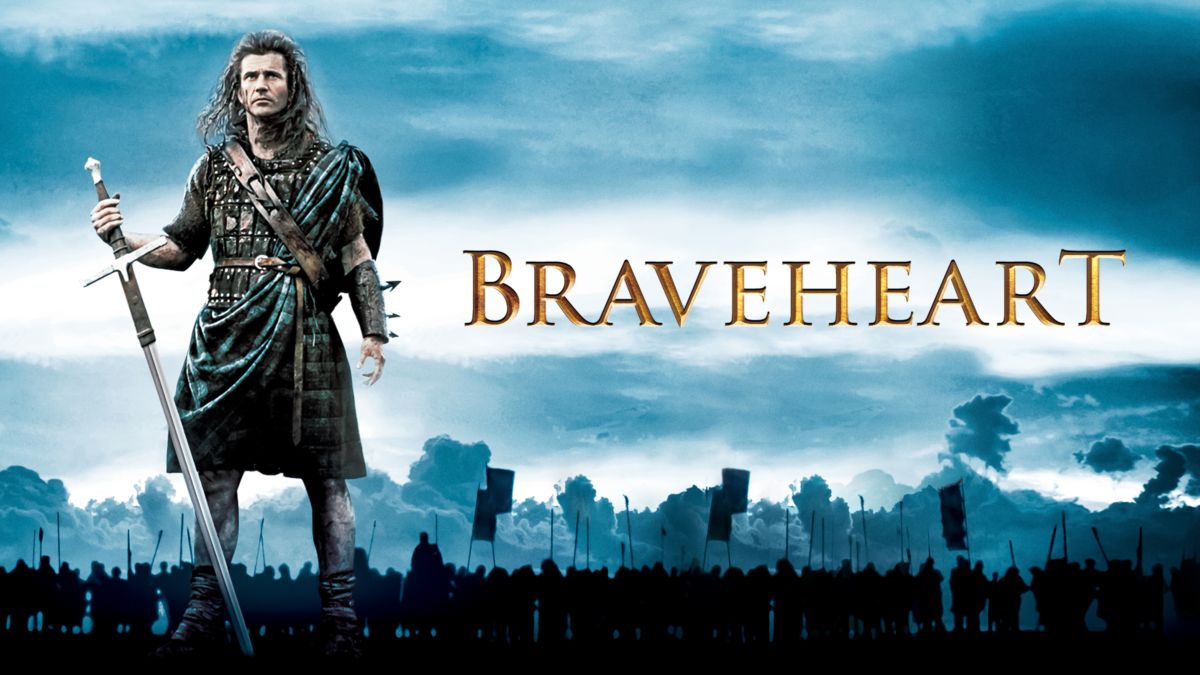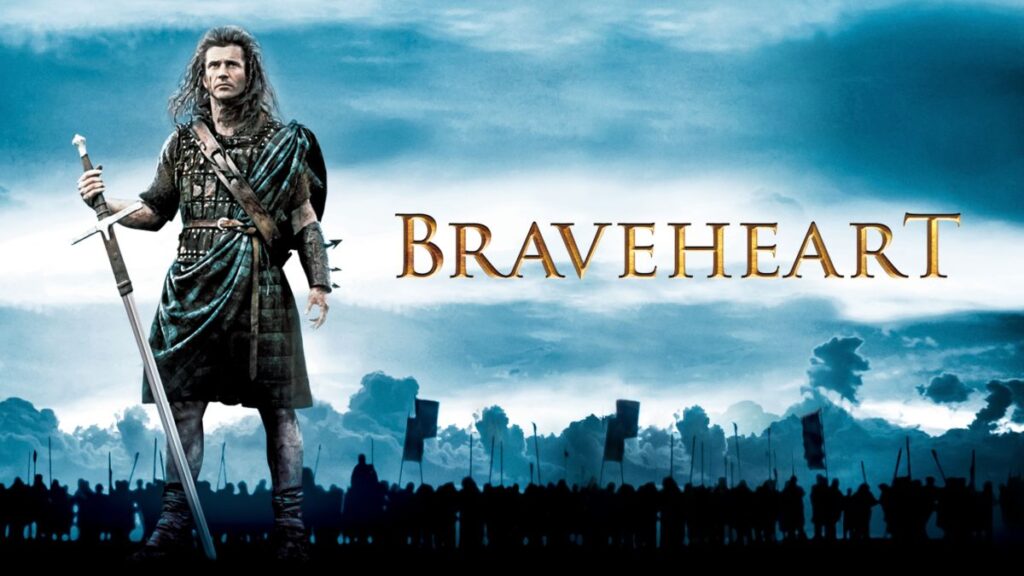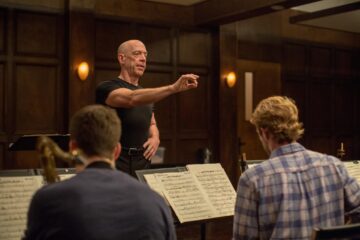Braveheart (1995) Vocabulary

In Braveheart, Scottish warrior William Wallace leads his countrymen in a rebellion to free his homeland from the tyranny of King Edward I of England.

Links for Braveheart (1995)
Browse Other Vocabulary Practices for Movies

Vocabulary Presentation for Braveheart (1995) Part 1
CEFR B1 and above potentially unknown vocabulary for Braveheart (1995):
- Historians: Scholars or experts who study and write about history.
Explanation: Historians are individuals who research, analyze, and interpret historical events and developments to gain a better understanding of the past. - Pagans: People who follow religions other than the main world religions, especially those of ancient or traditional origins.
Explanation: Pagans are individuals who adhere to non-Christian, non-Islamic, or non-Jewish religions, often associated with ancient or nature-based belief systems. - Truce: An agreement between enemies or opposing sides to stop fighting or hostilities for a specific period.
Explanation: A truce is a temporary cessation of conflict or hostility between warring parties, typically with the intention of negotiating peace or resolving disputes. - Commoner: An ordinary or average person, typically not belonging to the nobility or aristocracy.
Explanation: Commoners are individuals who do not hold noble or high-ranking social status, often referring to the general population or those without special privileges or titles. - Nobles: Members of the aristocracy or privileged social class, typically holding titles and often having inherited wealth and power.
Explanation: Nobles are individuals who belong to the highest social class, often possessing inherited titles, land, and privileges, such as those granted by birthright or royal appointment. - Gathering: A meeting or assembly of people, usually for a specific purpose.
Explanation: A gathering refers to the coming together of individuals or groups, often with the intention of discussing, sharing, or participating in a particular event, activity, or ceremony. - Back of my hand: An expression indicating a physical punishment or reprimand.
Explanation: “Feel the back of my hand” is an idiom used to suggest that someone will be subjected to physical discipline or a forceful gesture of disapproval. - Suicide: The act of intentionally taking one’s own life.
Explanation: Suicide refers to the deliberate act of ending one’s own life, typically due to overwhelming emotional distress, mental health issues, or other personal reasons. - Wits: Mental abilities, intelligence, or cleverness.
Explanation: “Using our wits” refers to employing one’s intelligence, resourcefulness, and problem-solving skills to overcome challenges or difficult situations. - Prima nocte: A term meaning “first night” in Latin, referring to a historical practice where a lord or nobleman claimed the right to sleep with a newly married commoner on their wedding night.
Explanation: Prima nocte, also known as the right of the first night or droit du seigneur, was a controversial and widely debated custom in feudal societies, granting the lord or ruler sexual rights over a subordinate’s bride on their wedding night. - Contender: A person who competes or vies for a particular position or title.
Explanation: A contender is an individual who actively seeks or competes for a specific role, position, or title, often engaging in a competitive or political process to gain recognition or achieve their goal. - Soldiery: The collective term for soldiers or military personnel.
Explanation: Soldiery refers to the body of individuals who serve as soldiers or members of the armed forces, often indicating the overall military establishment or the soldiering profession. - Leniency: Showing mercy, tolerance, or flexibility in the application of rules or punishments.
Explanation: Leniency refers to the act of being more forgiving or understanding, especially when enforcing laws, rules, or regulations, often involving the reduction or mitigation of penalties or consequences. - Assault: A violent physical attack or act of aggression.
Explanation: Assault refers to the intentional act of physically attacking or harming someone, usually resulting in bodily injury or the threat of immediate harm. - Archers: Skilled individuals who shoot arrows using a bow.
Explanation: Archers are individuals trained in the use of a bow and arrow, typically employed in warfare or for hunting purposes. - Scraper: A colloquial term for a troublemaker or someone prone to causing conflicts or engaging in fights.
Explanation: The term “scraper” is used to describe an individual who frequently gets involved in altercations, fights, or confrontations, often seen as a troublemaker or someone who enjoys brawling.
Note: The vocabulary provided here is not an exhaustive list of potentially unknown words in for Braveheart (1995). The selected words are based on their level of difficulty and relevance to the context.

Vocabulary Presentation for Braveheart (1995) Part 2
CEFR B1 and above potentially unknown vocabulary for Braveheart (1995):
- Indulge (verb): To allow oneself to enjoy or take part in something, especially something considered luxurious or pleasurable.
Explanation: In this context, “indulge me” means to satisfy or fulfill the speaker’s request, even though it may seem unnecessary or wasteful. - Amadans (noun): A Scottish Gaelic word meaning “fools” or “idiots.”
Explanation: The word is used here to refer to people who are being foolish or acting inappropriately. - Garrison (noun): A body of troops stationed in a particular location to defend it.
Explanation: In this context, it refers to the English military stationed at a castle. - Aye (exclamation): An informal word used to express agreement or affirmation, similar to “yes.”
Explanation: “Aye” is a Scottish variant of “yes” and is commonly used in Scottish English. - Convene (verb): To bring people together for a meeting or gathering.
Explanation: In this context, it means to call for a meeting of the military council. - Routed (verb): Defeated or dispersed with a forceful and decisive victory.
Explanation: “Routed” means to completely defeat or scatter the opposing forces. - Magistrate (noun): A civil officer or judge who administers the law, especially one who conducts a court dealing with minor offenses and holds preliminary hearings for more serious ones.
Explanation: In this context, it refers to a local judicial authority or judge. - Quell (verb): To put an end to or suppress (a rebellion, disturbance, or disorder), typically by the use of force.
Explanation: “Quell” means to suppress or extinguish something, often referring to bringing an end to a rebellion or unrest. - Foregone conclusion (phrase): An outcome that is considered certain to happen or inevitable.
Explanation: “Foregone conclusion” means a result that is already known or expected because it is highly likely or predictable. - Cordial (adjective): Warm and friendly; sincerely felt.
Explanation: In this context, it means that the response or message was less friendly or diplomatic than what was expected or customary.
Vocabulary Presentation for Part 3
CEFR B1 and above potentially unknown vocabulary for Braveheart (1995) :
- allegiance: Loyalty or commitment to a person, group, or cause.
Explanation: In the context of the script, it refers to the loyalty shared by the nobles of the country with England. - conscriptions: The compulsory enlistment of people into military service.
Explanation: It refers to the act of requiring individuals to serve in the military. - truce: An agreement between enemies or opposing parties to stop fighting or hostilities for a certain period.
Explanation: In the script, it is suggested as a possible resolution to the conflict between the characters. - bribe: To offer, give, or receive something valuable to influence someone’s actions or decisions.
Explanation: In the script, it refers to an attempt to persuade someone by offering them money or incentives. - ruse: A deceptive maneuver or plan.
Explanation: It signifies a tactic or strategy used to deceive or mislead someone. - arrayed: Organized or positioned in a particular way.
Explanation: In this context, it refers to the positioning or arrangement of military forces. - quibble: To argue or raise objections about trivial matters.
Explanation: It means to engage in petty or insignificant arguments or disputes. - barter: To negotiate or trade goods or services without using money.
Explanation: It suggests the act of exchanging goods or services directly without the involvement of currency. - embroidered: Decorated with ornamental needlework.
Explanation: It means to adorn or embellish something with decorative stitching. - prevailing: Existing or most commonly accepted at a particular time or in a particular place.
Explanation: It refers to the dominant or widely accepted opinion or practice. - graver: Showing seriousness or solemnity.
Explanation: It signifies a more serious or somber expression or demeanor. - betray: To deceive, be disloyal to, or break one’s trust.
Explanation: It means to act in a way that goes against someone’s trust or loyalty.
Note: The above words have been explained without giving any spoilers or mentioning character names.

Vocabulary Presentation Part 4
Potentially unknown vocabulary for Braveheart (1995) :
- Betray: to be disloyal or unfaithful to someone
: In this context, it means that all men have been disloyal or unfaithful in some way. - Lose heart: to become discouraged or lose hope
: The speaker expresses a desire not to lose hope or become discouraged. - Liability: something or someone that poses a risk or is a disadvantage
: The speaker refers to someone as a liability, suggesting that they are more of a risk now than before. - Dispersed: scattered or spread out
: The speaker suggests that the “sheep” (referring to the followers) can be easily scattered if they attack the leader. - Assassins: people who are skilled at carrying out targeted killings
: The speaker refers to selecting skilled individuals for the purpose of carrying out assassinations. - Hostage: a person held captive to force certain actions or concessions
: The speaker expresses concern that the princess might be taken hostage or put in danger. - Distressed: extremely upset or troubled
: The speaker suggests that their son would be greatly upset if anything happened to the princess. - Ally: a person or group that cooperates with or supports another
: The speaker mentions that if the princess were killed, they could use it as an opportunity to gain the support of the king of France. - Ambush: a surprise attack from a concealed position
: The speaker acknowledges the risk of William Wallace detecting an ambush due to his sharp senses. - Purification: here, it refers to a painful method of punishment or torture
: The speaker tells William Wallace that he will receive his purification, which implies a painful death. - Allegiance: loyalty or commitment to a person, group, or cause
: The speaker asks William Wallace if he swears allegiance to the king, meaning if he pledges loyalty to him. - Filth: a derogatory term for someone considered dirty or disgusting
: The guard insults William Wallace by referring to him as “filth.” - Tower: a tall structure used for confinement or imprisonment
: The guard suggests that if William Wallace swears allegiance to the king, he might be confined to a tower instead of being executed. - Homage: respect, honor, or tribute paid to someone
: Robert the Bruce goes to pay homage to the armies of the English king, showing respect or tribute. - Endorsement: official support or approval
: Robert the Bruce seeks the endorsement of the English king for his crown, meaning he wants his official support or approval. - Bannockburn: a location in Scotland where a significant battle took place
: The speaker refers to the fields of Bannockburn, where the Scottish patriots fought for their freedom.



0 Comments